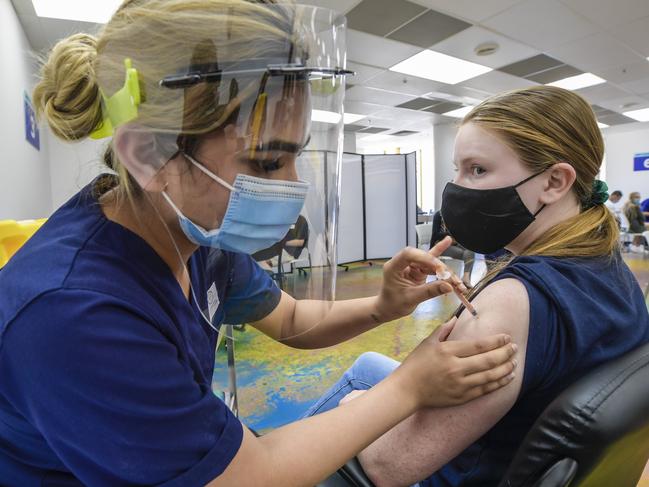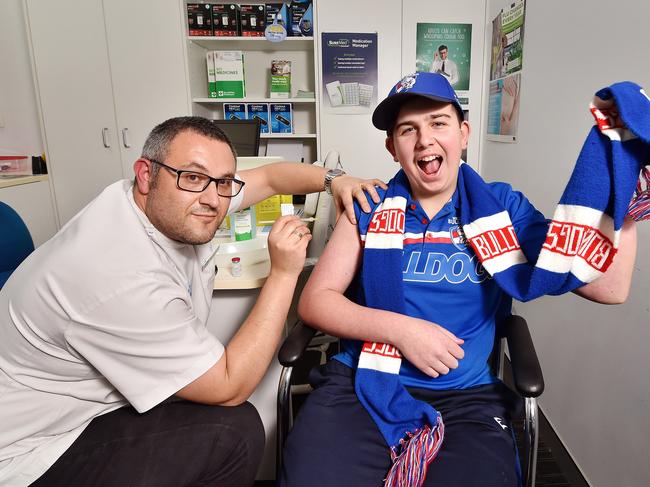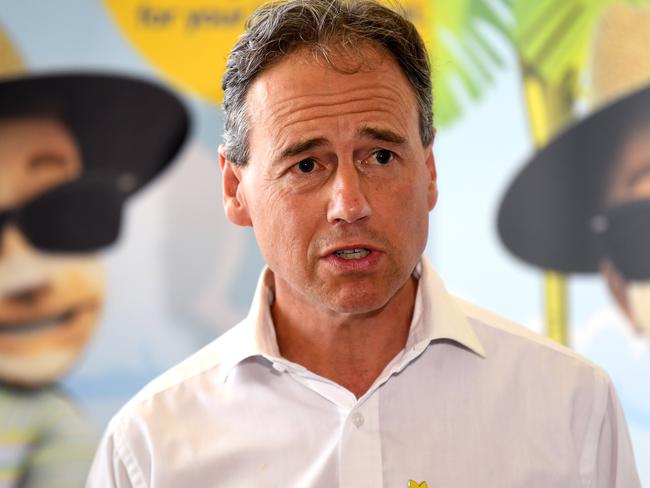New Australian Covid vaccine booster rules: Your questions answered
The recommended timing for a Covid-19 booster shot has been brought forward as Aussies face increasing transmission of the Omicron variant. Here’s what you should know.
Coronavirus
Don't miss out on the headlines from Coronavirus. Followed categories will be added to My News.
Confused about the rules regarding Covid-19 booster shots? Here’s what you need to know.
WHAT JUST HAPPENED?
Health Minister Greg Hunt just announced the recommended timing of the Covid-19 booster shot has been brought forward from five months to four months from January 4, 2022, and for it to be brought forward to three months from January 31, 2022.
Initially the recommended time frame for a booster shot was six months after the second dose of a Covid-19 vaccine, but this got changed to five months less than a fortnight ago. Mr Hunt said two million Australians have already received a booster shot.
WHO IS ELIGIBLE?
ATAGI, the Australian Technical Advisory Group on Immunisation, advised booster doses only be given to people aged 18 and over.
WHY IS IT HAPPENING?
In an explanatory statement, the members of ATAGI said the course of the pandemic had “significantly changed” in recent weeks because of the arrival of the Omicron variant.
“Internationally, the Omicron variant has become dominant in several countries with case numbers growing rapidly. Preliminary data from large superspreading events in New South Wales involving younger people suggested that two doses of vaccine did not provide any significant protection against SARS-CoV-2 infection due to the Omicron variant,” the ATAGI statement said.
WHAT IS THE PROBLEM WITH TWO DOSES ALONE?
Studies from South Africa and the UK showed fully vaccinated people were still susceptible to infection from the Omicron variant, but the vaccines did diminish their chances of getting very sick or ending up in hospital.
Researchers from London’s Imperial College found people with Omicron were 15 per cent less likely to attend hospital, and 40 per cent less likely to be hospitalised for a night or more, compared to the Delta variant.

WHAT ABOUT IMMUNOCOMPROMISED PEOPLE?
ATAGI has also updated its advice for immunocompromised people, many of whom have already had a third dose of Covid-19 vaccine. Those who have had three doses should now get a booster shot four months after their latest dose – and “when practical”, this should be within three months.
WHAT BOOSTER SHOT SHOULD I GET?
Both Comirnaty (Pfizer) or Spikevax (Moderna- 50µg) are recommended for use as a booster vaccine, and both are considered equally acceptable. AstraZeneca can be used for people who have contraindications to the Pfizer and Moderna vaccines.
WHERE CAN I GET MY BOOSTER?
Search our table below for places where you can get vaccinations.
Brenton Hart, Chief Pharmacist with TerryWhite Chemmart, advised Australians to book a booster appointment online as “most clinics are simply not able to take walk-ins”.
“A lot of vaccine providers are under immense pressure at the moment with the demand for boosters, and there are still people trying to get their primary course,” he said.
While there were no issues regarding the supply of the booster shots, Mr Hart said staffing could become an issue in some pharmacies as workers themselves might have to isolate if exposed to the virus.
Some TerryWhite Chemmart outlets currently had bookings available for next week and the first week of January, Mr Hart said, but he expected all the company’s pharmacies to hit full capacity by mid to late January.

SHOULD I REBOOK RIGHT NOW IF I AM BOOKED IN?
Coming on Christmas Eve, the booster rule change has not come at an ideal time. In its statement, ATAGI said the new booster regime “could be achievable from 4 January, although some providers may have flexibility to administer before that time”.
NSW Health said those who had been due for a booster over the Christmas/New Year period should “have it a little earlier”.
Rebooking will likely not be easy, with some GPs and pharmacies booked out for immunisation and booster appointments for weeks.
But ATAGI has also stressed a booster is “particularly important” for at-risk groups, including people at high risk of occupational exposure, those aged over 60, people with underlying medical conditions, people working in aged/disability care and Aboriginal and Torres Strait Islander people.
DOES AUSTRALIA HAVE ENOUGH SUPPLY?
Mr Hunt and Chief Medical Officer Professor Paul Kelly said in a statement: “Australia has more than enough supply of the Pfizer and Moderna vaccines to roll out booster doses to the newly eligible cohort from 4 January – through more than 10,000 vaccination sites including GPs, community pharmacies, Aboriginal Community Controlled Health Services, and state and territory clinics. There are currently over 20 million doses in Australia of which over five million have already been placed with States and Primary Care teams on the basis of their forward orders. Where jurisdictions believe they have sufficient capacity to bring forward the commencement of delivery of booster doses sooner, without displacing people with higher priority eligibility in accordance with the ATAGI recommendations, they will have the flexibility to do so.”
Mr Hunt said of the 3.2 million Australians who were currently eligible for a booster, 2 million had had the jab. The number of people eligible for a booster would be 7.5 million by January 4 and 16 million by January 31, he said.

WHAT ABOUT KIDS?
Arrangements are in place to roll out vaccines to children aged five to 11 years from January 10, 2022, with specialised children’s doses arriving in Australia over recent days and now undergoing batch testing by the Therapeutic Goods Administration (TGA).
WHAT ABOUT SIDE EFFECTS?
Jaya Dantas, a Professor of International Health at Curtin University in WA, said studies to date showed “very few adverse reactions to booster doses”.
But some people do feel sick and fatigued after receiving the booster, and in the case of one family member, this lasted for a day and a half, she said.
Because Pfizer and Moderna are being offered in Australia as the booster shots, this does mean anybody who had the Astra Zeneca jab for their primary dose will now get an mRNA vaccination for the first time.
WHO IS NOW ‘FULLY VACCINATED’?
One thing today’s updated ATAGI advice did not mention was whether this shifted their definition of full vaccination.
Currently, the federal government recognises full vaccination as anybody who has completed a full course of a recognised Covid-19 jab – and this definition has all kinds of implications for things from flying, to working in many organisations.
Prof Dantas said ATAGI should “change the definition of ‘fully vaccinated’ to include three shots, with perhaps the caveat that vaccines will need to be reviewed if new variants emerge.”
ATAGI were “very cautious in their approach,” she said, but they would be looking at modelling on the issue now, she said.

Dr Andy Flies, a Senior Research Fellow at the Menzies Institute for Medical Research, University of Tasmania, said changing the definition of fully vaccination could be complex because there is natural variability between people, and some people will just have less natural immunity to infection even after getting the jabs.
WHAT ABOUT THE FUTURE? WILL WE NEED MORE BOOSTERS?
Israel is already moving on to a second booster, or a fourth dose of Covid-19 vaccine for its citizens, but infectious diseases experts said it was too early to say if Australia would need something similar in 2022.
“This is a single stranded RNA virus, and they are notorious for mutating,” Dr Flies said.
But he said prior to 2020, there were already four or five coronaviruses in circulation that were not deadly, and it was hoped future variants of Covid-19 would be like a cold.
“Until then, boosters may fill the gap, just to make sure our health systems can function,” he said.
Prof Dantas said it was premature to talk of additional boosters in the Australian context, but 10 of the 11 Covid-19 variants had emerged in the developing world, and with low vaccination rates there, more will likely arise.
Originally published as New Australian Covid vaccine booster rules: Your questions answered
Read related topics:Explainers



